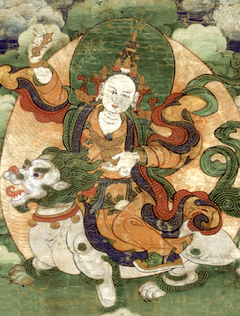Tseringma Praise
Sweet Song of the Kalaviṅka
In Praise of Tseringma
by Jamyang Khyentse Chökyi Lodrö
Atop Mount Tönting, [1] like a giant pillar planted in the sky,
Brilliantly you abide, the colour of flawless crystal,
Charming and majestic, however you’re viewed,
Delightful Tsering Gyalmo, remain as my companion.
Euphoniously, not harshly, I call out to you.
For you I offer the music of cymbals and other instruments, and
Gather an ocean of gifts—alcohol, tea, and sweet white curds.
How like the autumn moon you are, surrounded by your retinue.
Immensely powerful protectress of the Tathāgata’s teachings,
Just as in reality you are a wisdom ḍākinī, even so you
Keep guard of the teachings as a queen of all the mamos,
Lovely and youthful in appearance.
Majestically, like Venus, you beautify the world,
Numberless are the arrogant adversaries you captivate.
Overflowing with riches like a wish-fulfilling tree or cow of plenty, you are the
Perfect companion to every living being.
Quenching and cooling like the camara fan,[2]
Relieving the torment of oppressive heat,[3]
Sweet as the fragrant scent of jasmine incense,
The way you dance about is elegant and dazzling.
Uppermost, like the brilliant jewels of your crown,
Vibrant with a radiance that is never interrupted.
Wholeheartedly and single-pointedly we venerate you,
Excellent friend, you who are our heart’s companion.
You who undo the knots in inflexible channels,
Zenithal in accomplishment just like Kambala,[4]
You cause the teachings of the Śāsanadharas to flourish[5]
And crush the forces of evil throughout the world.
Your cheerful laughter resounds: "Ha! Ha! Hi! Hi!"
Revealer of the meaning of A, the unborn, I praise you.
Remain without ever parting from the experience
Of the vajra body’s city of channels, energies and essences.
Activate the great potential of awareness, the definitive secret,
And lead me to the realm of the innate three kāyas.
Eliminate at every stage obstacles to the practice of sacred Dharma
And create circumstances that are conducive.
Carry out directly your sacred activity
Of bringing about a clear, unobscured experience
Of the auspicious conditions for symbolic methods
In actual waking life, in visions, and in dreams.
Cause the teachings and those who uphold them to flourish.
Eliminate all that plagues the various realms of this world.
Enhance the environment and beings with the splendours of a perfect age,
And flood the world with myriad moonbeams of virtue and excellence.
Thus, Tsuklak Lungrik Mawé Nyima wrote this in Darjeeling on the first 'joy' of the Āśāḍha month of the Earth Dog year.[6] Siddhir-bhavantu! Maṅgalam.
| Translated by Adam Pearcey with the generous support of the Khyentse Foundation and Tertön Sogyal Trust, 2022.
Bibliography
Tibetan Editions
'jam dbyangs chos kyi blo gros. "tshe ring mar bstod pa ka la ping+ka’i dbyangs snyan/" In gsung thor bu/_'jam dbyangs chos kyi blo gros/ (rgya gar bir'i par ma/). 2 vols. null: null, null. (BDRC W21814). Vol. 1: 186–188
'jam dbyangs chos kyi blo gros. "tshe ring mar bstod pa ka la ping+ka’i dbyangs snyan/" In gsung 'bum/_'jam dbyangs chos kyi blo gros/ (dbu med/). 8 vols. Gangtok: Dzongsar Khyentse Labrang, 1981–1985. (W21813). Vol. 1: 151–153
'jam dbyangs chos kyi blo gros. "tshe ring mar bstod pa ka la ping+ka’i dbyangs snyan/" In 'jam dbyangs chos kyi blo gros kyi gsung 'bum. 12 vols. Bir: Khyentse Labrang, 2012. (W1KG12986). Vol. 11: 275–276
Lung rigs smra ba'i nyi ma. "tshe ring mar bstod pa ka la ping+ka’i dbyangs snyan/" In mkha' 'gro’i chos mdzod chen mo. 53 vols. Lhasa: Bod ljongs bod yig dpe rnying dpe skrun khang, 2017. Vol. 50: 267–268
Version: 1.2-20230714
-
mthon mthing ri. Another name for jo mo lha ri, Mount Everest. ↩
-
i.e., the tail of a yak which can be used as a chowry or fly whisk. The word camara is commonly used in Tibetan abecedarian poems. ↩
-
The precise meaning of ka spu ra is unclear. ↩
-
Tib. lwa ba pa. Kambala/Kambalapāda was one of the eighty-four mahāsiddhas. ↩
-
Śāsanadhara translates the Tibetan bstan 'dzin, meaning 'holders of the teachings'. Jamyang Khyentse writes śāsadhara, which is obscure, but śāsanadhara is likely to be the intended term. ↩
-
i.e., the first day of the sixth Tibetan month, corresponding to 17 July 1958. ↩
